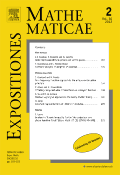
EXPOSITIONES MATHEMATICAE
Scope & Guideline
Championing Excellence in Mathematical Scholarship
Introduction
Aims and Scopes
- Nonlinear Analysis and Differential Equations:
The journal prominently features research on nonlinear elliptic and parabolic problems, as well as on the dynamics of differential equations, often exploring their analytical and geometrical properties. - Algebra and Number Theory:
A significant volume of articles investigates algebraic structures, number theory, and related fields, including topics like Diophantine equations, algebraic topology, and homotopy theory. - Geometry and Topology:
Research related to various aspects of geometry, including geometric analysis, algebraic geometry, and topological properties of manifolds, is a core focus area, showcasing the interplay between geometry and mathematical physics. - Functional Analysis and Operator Theory:
The journal publishes works in functional analysis, particularly those addressing operator theory, including studies on spectral theory, Hilbert spaces, and operator algebras. - Combinatorial and Graph Theory:
There is a consistent emphasis on combinatorial mathematics and graph theory, with articles exploring applications in theoretical computer science and discrete mathematics. - Mathematical Physics and Applications:
Expositiones Mathematicae also emphasizes the mathematical foundations of physics, with studies that connect abstract mathematical concepts to physical theories, particularly in quantum mechanics and statistical mechanics.
Trending and Emerging
- Nonlinear Dynamics and Chaos Theory:
Recent papers indicate a growing interest in nonlinear dynamics and chaotic systems, especially in relation to differential equations and their applications in various fields, including physics and engineering. - Algebraic Geometry and Moduli Spaces:
There is an increasing focus on algebraic geometry, particularly moduli spaces and their applications in number theory and theoretical physics, suggesting a vibrant intersection of these disciplines. - Mathematical Machine Learning:
The intersection of mathematics and machine learning is gaining traction, with more articles exploring mathematical models and theories that underpin machine learning algorithms, reflecting the rising importance of data science. - Geometric Analysis and PDEs:
Emerging trends highlight the significance of geometric analysis in the study of partial differential equations, with a particular emphasis on their geometric properties and applications. - Applications of Category Theory:
There is a noticeable increase in research utilizing category theory to provide a unifying framework for various mathematical concepts, signaling a trend towards abstract and foundational approaches in mathematics.
Declining or Waning
- Classical Analysis:
Research in classical analysis, particularly in areas like real analysis and complex variables, has seen a noticeable reduction, possibly due to the increasing emphasis on more modern analytical techniques or interdisciplinary approaches. - Elementary Number Theory:
There has been a decrease in the exploration of elementary number theory topics, suggesting a potential shift towards more complex and abstract aspects of number theory, such as algebraic number theory. - Historical Mathematics:
Papers focusing on the historical aspects of mathematics or the biographies of mathematicians have become less common, indicating a waning interest in this niche area of research. - Purely Theoretical Mathematics:
The trend shows a decline in publications that focus solely on theoretical mathematics without practical applications, perhaps reflecting a broader trend towards applied mathematics and interdisciplinary research.
Similar Journals

Bulletin Mathematique de la Societe des Sciences Mathematiques de Roumanie
Pioneering Insights in the World of MathematicsThe Bulletin Mathematique de la Societe des Sciences Mathematiques de Roumanie, published by SOC MATEMATICE ROMANIA, is a distinguished platform dedicated to the dissemination of advanced mathematical research and developments. With ISSN 1220-3874 and E-ISSN 2065-0264, this journal serves the global mathematical community, particularly in Romania, fostering collaboration and innovation in varied mathematical disciplines. Despite being categorized in the Q3 quartile of the *Mathematics (miscellaneous)* field and holding a Scopus rank placing it in the 19th percentile, the journal remains committed to publishing high-quality articles that explore theoretical and applied mathematics. Running from 2008 to 2024, it aims to encourage the sharing of knowledge and advancements within both academic and practical domains, affirming its importance as a valuable resource for researchers, professionals, and students alike. Although the journal does not currently offer open access, it contributes to the mathematical discourse through the rigorous selection of papers that adhere to high scholarly standards.
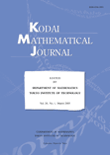
Kodai Mathematical Journal
Illuminating the Path of Mathematical DiscoveryKodai Mathematical Journal is a distinguished publication dedicated to advancing the field of mathematics, particularly in miscellaneous areas. Established in 1949, this esteemed journal has been a reputable source for researchers and practitioners who seek to contribute to the rich landscape of mathematical knowledge. Published by KINOKUNIYA CO LTD, the journal is based in the academic environment of Tokyo Institute of Technology and serves a global audience with rigorous and insightful research articles. Despite its current Q3 quartile ranking in the Scopus Mathematics category, which reflects its niche but impactful contributions, the journal is poised for growth; the convergence of traditional and novel mathematical techniques promises to enhance its relevance further. Researchers, professionals, and students are encouraged to engage with the rich content of the journal, aimed at fostering collaboration and nurturing innovation in the mathematical community. While currently not available as Open Access, Kodai Mathematical Journal remains a critical resource for those passionate about mathematics and its applications.
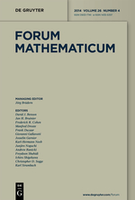
FORUM MATHEMATICUM
Illuminating the Path of Mathematical InquiryFORUM MATHEMATICUM, published by WALTER DE GRUYTER GMBH, is a distinguished academic journal based in Germany, known for its significant contributions to the field of mathematics. With an ISSN of 0933-7741 and an E-ISSN of 1435-5337, the journal features comprehensive studies ranging from applied mathematics to diverse mathematical disciplines. Having maintained a commendable presence since 1989, FORUM MATHEMATICUM has achieved notable classification rankings, including Q2 in Applied Mathematics and Q1 in miscellaneous Mathematics as of 2023. Additionally, it holds a Scopus rank within the top 60th percentile in General Mathematics, making it a prominent platform for researchers and professionals seeking rigorous analysis and innovative methodologies in mathematics. While the journal does not currently offer open access, its rich content is pivotal for advancing mathematical theory and applications, appealing to students and seasoned academics alike.
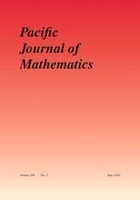
PACIFIC JOURNAL OF MATHEMATICS
Unveiling Innovative Research in the Realm of MathematicsThe PACIFIC JOURNAL OF MATHEMATICS, established in 1951 and published by Mathematical Sciences Publishers, is a premier peer-reviewed journal in the field of mathematics, renowned for its rigorous scholarship and impactful research contributions. With an HIndex that reflects its sustained academic influence, this journal has been categorized within the Q1 quartile in the field of mathematics (miscellaneous) as of 2023, showcasing its position among the top-tier mathematics journals globally. Although the journal operates under a traditional subscription model rather than an Open Access format, it remains dedicated to disseminating original research that spans various domains within mathematics. Researchers, professionals, and students alike will find the journal's breadth of topics and commitment to quality work instrumental in advancing their understanding and exploration of mathematical concepts. This esteemed journal continues to thrive as a vital resource for the mathematical community through its comprehensive collection of articles from a diverse range of mathematical disciplines, thus maintaining a significant role in shaping the future of mathematical inquiry.

Forum of Mathematics Sigma
Connecting scholars through open access to cutting-edge research.Forum of Mathematics Sigma is a premier open access journal published by Cambridge University Press that has been at the forefront of mathematical research since its inception in 2013. With a strong emphasis on advancing the fields of mathematics, the journal consistently achieves Q1 rankings across multiple categories, including Algebra and Number Theory, Analysis, and Computational Mathematics. This distinction highlights its impact and relevance within the scholarly community. The journal prides itself on providing a platform for innovative research, fostering collaboration among researchers and practitioners across various mathematical disciplines. Open access publication ensures that cutting-edge findings are widely available to readers globally, enhancing the dissemination of knowledge. With an address in the heart of Cambridge, England, Forum of Mathematics Sigma is dedicated to promoting high-quality research and making significant contributions to the development of mathematics.

HOUSTON JOURNAL OF MATHEMATICS
Fostering Innovation in Miscellaneous MathematicsHOUSTON JOURNAL OF MATHEMATICS, published by the University of Houston, serves as a valuable platform for disseminating significant findings in the field of mathematics, specifically within the realm of miscellaneous mathematics. Despite its current categorization in Q4 for 2023, the journal plays a crucial role in fostering academic discussion and exploration among researchers, professionals, and students alike. With its ISSN 0362-1588, the journal has been publishing original research since 1996, with a recent gap filled from 2022 to 2023, thereby continuing to contribute to the mathematical community. While it does not currently offer open access options, the journal's commitment to quality research maintains its relevance within the field and invites submissions that can elevate its standing. Located in the vibrant city of Houston, Texas, the journal not only emphasizes theoretical advancements but also encourages applied mathematical research that intersects with other disciplines, enhancing its significance and reach.
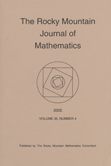
ROCKY MOUNTAIN JOURNAL OF MATHEMATICS
Exploring the Depths of Mathematical InnovationROCKY MOUNTAIN JOURNAL OF MATHEMATICS, published by the Rocky Mountain Math Consortium, serves as a critical platform for researchers and practitioners in the field of mathematics since its inception in 1971. With a notable presence in the academic community, this journal covers a broad spectrum of mathematical disciplines, positioning itself in the Q2 category for Mathematics (miscellaneous) as of 2023. Despite being a subscription-based journal, it is recognized for its rigorous peer-review process and contributions to theoretical and applied mathematics, helping to advance knowledge and foster collaboration among mathematicians. The journal's ISSN number is 0035-7596 and its E-ISSN is 1945-3795, reflecting its commitment to accessibility and dissemination of high-quality research. Based in Tempe, Arizona, at Arizona State University, the journal continues to play an important role in shaping contemporary mathematical discourse through well-researched articles and innovative studies, aiming to bridge gaps between various mathematical subfields and engage a diverse audience, including students and established researchers alike.
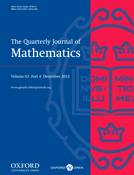
QUARTERLY JOURNAL OF MATHEMATICS
Advancing Mathematical Frontiers with Every IssueQuarterly Journal of Mathematics, published by Oxford University Press, stands as a pivotal resource for the mathematical community, focusing on a broad spectrum of topics in the field of mathematics. With its esteemed history dating back to 1930, this journal continues to foster innovative research and discussions, providing a platform for scholars to share their findings and insights. Although the journal currently holds a Q3 classification in mathematics (miscellaneous) and is ranked #207 among general mathematics publications in the Scopus database, its commitment to quality and rigorous peer review ensures that it remains relevant and insightful. Researchers, professionals, and students alike will find the Quarterly Journal of Mathematics an invaluable tool for advancing knowledge and understanding in various mathematical disciplines, making it an essential addition to any academic library.
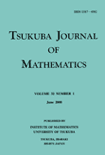
Tsukuba Journal of Mathematics
Advancing Mathematical Frontiers with Rigorous ResearchTsukuba Journal of Mathematics is a distinguished publication dedicated to advancing the field of mathematics through the dissemination of innovative research and comprehensive studies. Published by the University of Tsukuba, Department of Mathematics, this journal serves as a vital platform for mathematicians, researchers, and students to engage with cutting-edge mathematical theories and methodologies. Although currently not available as an open-access journal, it maintains a strong academic presence, contributing significantly to the global mathematical landscape. The journal invites submissions across various branches of mathematics, aiming to foster scholarly communication and collaboration. The ISSN 0387-4982 and the E-ISSN 2423-821X further establish its credibility and accessibility among the academic community, supporting its critical objective of facilitating high-quality research output. Situated in Tsukuba, Japan, a hub for scientific research and development, the Tsukuba Journal of Mathematics is committed to bridging gaps in mathematical knowledge and encouraging exploration of novel ideas.

Periodica Mathematica Hungarica
Unveiling the Depths of Mathematical Knowledge.Periodica Mathematica Hungarica is a prestigious academic journal published by Springer, focusing on the field of mathematics, with a particular emphasis on miscellaneous mathematical studies. Established in 1971, this journal has maintained its commitment to advancing mathematical research and its applications, making significant contributions over its converged years through 2024. With a Q2 ranking in the mathematics category as of 2023, it establishes itself as a vital resource within the mathematical community. Researchers and academics will find its inclusion in the Scopus database, ranking #189 out of 399 in general mathematics, indicative of its impact and relevance. Although it does not feature open access, the journal provides a wealth of high-quality peer-reviewed articles, thereby serving as an essential platform for the dissemination of innovative mathematical theories, methodologies, and findings. Engaging with the content of Periodica Mathematica Hungarica is crucial for anyone looking to stay at the forefront of mathematical research and development.